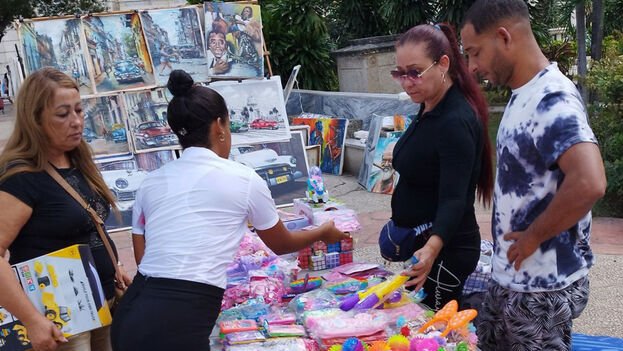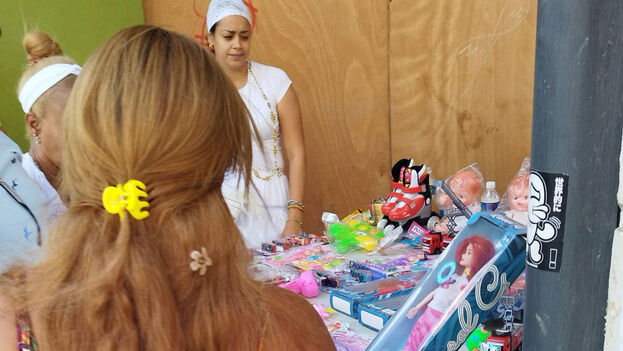
14ymedio, Yoani Sánchez, Havana, 6 January 2022– Dozens of people appeared at dawn this Friday outside the main currency stores in Havana with the hope of acquiring a toy or some candy as a gift for Three Kings Day. Curiously, among those anxious faces waiting to buy a doll, a plastic car, or some sweet cookies, there were many Cubans who grew up at a time when it was forbidden to talk about Melchor, Gaspar, and Baltasar.
In front of the entrance door of the Plaza de Carlos III in Central Havana, expectations were lowering by the minute. If in the early hours of the day there were those who still hoped to get some children’s toy or a table game, little by little it became clear that the only offers of the day were ham sandwiches and fried chicken that were sold in the area where one could pay in Cuban pesos.
The most cautious, and those with freely convertible currency (MLC) cards, had already devastated days earlier whatever candy, party favors, children’s costumes or trinket went on sale in those stores. Others plunged into the black market to buy some of the same merchandise resold at prices with three, four, and even five leading zeros. But there were also those who could not do either.
“Are you going to get something for the children?” asked a woman in her 50s today, who first looked over the counter at the entrance to Plaza de Carlos III in search of stuffed animals, balls or, at least, some modest colored pencils. She did not find what she was looking for with her eyes and did not receive an answer from the employee, more focused on explaining how many snacks they had per person and warning that one could not “line up twice.”

The woman who asked the unanswered question belonged to one of those generations of Cubans who did not directly experience the tradition of the Three Wise Men. By the time they were born, all religious practice had been demonized by the official discourse and the most extreme atheism had imposed itself in every corner of life on this Island. It was time to hide the image of the Sacred Heart of Jesus in a room, far from the prying eyes, to condemn the orishas in a corner and to hide a scapular under your clothes.
For decades, those monarchs who arrived on camels loaded with gifts remained alive only in the stories told by grandparents. To complete the burial of the tradition, Fidel Castro arranged that the time of the year in which Cuban children were going to be able to buy new toys would be in the month of July, far from January 6th, which is too close to another date that caused him resentment: Christmas.
Whoever seeks to erect a new creed and plant the columns of his own dogma begins by tearing down the pillars of all previous doctrine. To build Castroism, its main architect swept away any other previous belief. He wrote a new gospel, this time Marxist; he exalted himself as Messiah; he made rancor his favorite law and also sacralized his own images of bombers elevated to the revolutionary altar, and of guerrillas who, instead of promoting love for their neighbor, were invited to become a “cold killing machine.”
In this new and obligatory faith that was being built, some gentlemen who came to venerate a small child and give as a gift some gold, incense and myrrh, did not fit anywhere. The history they embodied was the opposite of what Castro sought to implant in Cuba because they spoke of humility despite power, of human understanding as well as social classes, and of an ancient tradition that dwarfed his social experiment.
So children who grew up in the 1960s and well into the 1990s didn’t write letters with their requests, nor did they experience that fluttering in their stomachs the night before they woke up and ran to find the gifts. Nor did they prepare water and grass to alleviate the fatigue of the camels. However, burying a tradition is a thankless task for someone who wants to undertake something as elusive as the spiritual practices of a community of individuals.
The insults against what the official press labeled as foreign custom, which the ideological extremists cataloged as petty-bourgeois backwardness, and the opportunists, who wanted to win points against power, pointed out as a form of cultural imperialism, were of little use. Little by little the Kings have been returning hand in hand with precisely those who did not enjoy them in their own childhood.
This Friday, at the corner of San Rafael and Galiano streets, just at the entrance to Havana Boulevard, a man was counting the money to buy a doll for his granddaughter. Next to him, a 45-year-old woman was haggling over the price of a small plastic fire engine and, a few yards away, a couple was hesitating between choosing a pink bear or a multicolored unicorn.
For all of them, the cost of those gifts represented a good part of their salary, but they ended up buying the toys. They did it because they are from that generation that, when they give a gift on January 6th, they are also making up for everything that the forbidden camels of their childhood did not bring them.
____________
COLLABORATE WITH OUR WORK: The 14ymedio team is committed to practicing serious journalism that reflects Cuba’s reality in all its depth. Thank you for joining us on this long journey. We invite you to continue supporting us by becoming a member of 14ymedio now. Together we can continue transforming journalism in Cuba.
